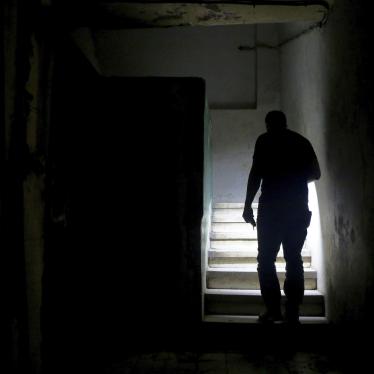(Beirut) – Governments of the Middle East and North Africa region should develop and fund comprehensive social protection systems that fulfill all people’s right to social security, Human Rights Watch said today, in signing the joint Declaration on Building Universal Social Protection in the Arab Region.
The declaration, organized by the civil society-led Arab Region Hub for Social Protection, aims to mobilize broad public support for universal social security systems – that is, a network of programs that protect all people from income insecurity at critical moments in their life course, rather than programs that are targeted based on socio-economic status – and urge governments to pursue new and innovative policy approaches to develop these systems.
“People in the Middle East and North Africa are facing increasing economic pressure and instability yet their governments are not responding effectively to these challenges,” said Sarah Saadoun, senior researcher on poverty and inequality at Human Rights Watch. “Regional governments should end their piecemeal and targeted approaches to social protection and develop strategies to enable everyone to realize their economic and social rights.”
Under international human rights law, everyone has the right to social security, which encompasses protection against income insecurity, including during old age, unemployment, sickness, or giving birth, and caring for dependents. Despite worsening economic conditions, governments across the region have not developed rights-based comprehensive social security strategies, relying instead on narrow and often error-prone programs that seek to target the “poorest” and “most vulnerable.” Only 40 percent of people in the MENA region have effective coverage in at least one area of social protection, according to the International Labour Organization (ILO).
The region, as elsewhere in the world, is facing slowing economies in 2023 “as double-digit food inflation adds pressure on poorer households,” the World Bank said in a report that also emphasizes that “the impact of food insecurity can span generations.” In response, many governments in the region have acknowledged the need to strengthen social protection programs.
However, most of these governments have rejected universal programs that provide support to everyone in particular categories, such as children and people with disabilities. Instead, they have adopted piecemeal systems in which only workers in the formal economy can access select benefits such as social pensions, unemployment insurance, or maternity grants, while workers in the informal economy, the majority in many countries, are entirely excluded.
Some governments, such as Jordan and Egypt, have new cash transfer programs to supplement employment-based social protection schemes, particularly as a means of mitigating the impact of removing or reducing government subsidies. For decades, consumer subsidies on items such as bread, electricity, water, and fuel have played an important role in the social contracts of many countries in the region, but governments are coming under significant budgetary and monetary pressures to reduce or remove them. Subsidies, which are also sometimes referred to as “universal,” differ from universal social protection benefits in that they generally are attached to goods, not people, and so the wealthier generally capture more of the spending because they consume more. Fossil fuel subsidies are enormously burdensome on government budgets and phasing them out is critical for confronting the climate crisis and facilitating the transition to renewable energy sources. Electricity subsidies alone constitute 40 percent of Lebanon’s debt.
However, while the wealthy receive the majority of energy subsidies in absolute terms, fuel and electricity price increases are felt most acutely by people with low incomes who will pay a higher share of their income for goods or services that are essential to their rights. A study of the International Monetary Fund’s (IMF) program in Egypt published in June 2023 by Friedrich Ebert Stiftung, an independent think tank, found that “household energy expenditure contributed to about 40 per cent of the increase in the cost of living between December 2015 and August 2019. For extremely poor households, the increase in energy expenditure constituted about 35.7 per cent of their 2015 incomes, whereas for the top income group it constituted about 21.5 per cent.”
A Human Rights Watch survey in Lebanon, where the government has failed to guarantee everyone’s right to accessible and affordable electricity, found that following the removal of fuel subsidies, as well as many government missteps and failures, the lowest 20 percent of income earners spent 88 percent of their income on electricity provided by diesel fueled generators.
The public savings generated from phasing out subsidies could provide an opportunity to shift towards social contracts rooted in human rights, including universal social protection, which is critical to protecting people from the price increases stemming from removing subsidies. Yet, most governments are missing on such opportunities and rather using means-tested programs that often reach only a small fraction of the population and exclude even many families whose income is below national poverty lines.
In Egypt, where roughly 60 million people live in or near poverty, the two main cash transfer programs established following the removal of fuel subsidies, Takaful and Karama, only reach 5 million families, which is approximately 17.5 million people. Families are ineligible for the program if they own a car or more than one feddan (4,200 square meters) of land, have a government job or pension, receive transfers from abroad, or have a formal private sector job. According to a 2022 World Bank review, about half of families who are eligible do not receive benefits.
In Jordan, the cash transfer program, also called Takaful and established following the removal of fuel subsidies, reached 120,000 families in 2022, fewer than one in five families living under the poverty line despite a sharp increase in poverty since the Covid-19 pandemic.
The Declaration on Building Universal Social Protection in the Arab Region is the first of its kind for the region, grounding effective social security in a rights-based approach, identifying it as a “responsibility of the state” rather than an “aid mechanism” or “humanitarian service.” Social security is a well-established human right in international law, including in the International Covenant on Economic, Social, and Cultural Rights (ICESCR). The UN treaty body charged with interpreting the covenant identified nine areas of support that should be included in universal social security systems: healthcare, sickness, old age, unemployment, employment injury, family and child support, maternity, disability, and survivors and orphans.
Countries that are parties to the covenant assume the obligations to respect, protect, and fulfil the right to social security in each of these areas, including by making the respective programs available, accessible, acceptable, and adaptable. This also requires providing benefits, whether in cash or in kind, that are adequate in both amount and duration.
A growing body of research, including by the ILO and Development Pathways, a consultancy group that supports developing countries in devising social protection policies, has documented that targeted social protection programs frequently have high margins of error, excluding eligible people and including many who are not. Reasons behind these errors include the use of inaccurate or outdated data, barriers created by the eligibility criteria or during the application process, and patronage and corruption.
Some governments have turned to expensive technologies to address these problems, but Human Rights Watch found that the automated technology that selects beneficiaries for Jordan’s Takaful program, developed with significant financing from the World Bank, is undermined by exclusion errors, discriminatory policies, and stereotypes about poverty.
Countries of the Middle East and North Africa are mostly low or middle-income and face challenges financing universal social protection programs, but they can close financing gaps and maximize resources in ways that protect human rights. In addition to using savings from phasing out fossil fuel subsidies, governments can adopt progressive tax systems, with higher rates for the wealthy and large corporations, combat tax evasion and avoidance, and eradicate illicit financial flows.
A 2019 global study by the ILO calculated that it would only cost an average of between 2 and 6 percent of a nation’s gross domestic product, depending on its region and country-income group, to establish universal social protection floors. The ILO identifies some ways to achieve this, including by reallocating existing public spending, raising social security revenues through a combination of taxes and dedicated contributions, increasing development aid and transfers, eliminating illicit financial flows, and improving debt management.
A 2023 IMF study found that Middle Eastern and North African countries are not effectively using existing tax structures to finance social protection. The IMF concluded that “[p]ersonal income taxes play little or no role in most countries in the Middle East and North Africa (MENA), yielding on average about 2 percent of GDP in revenue.” It further found that regional income tax systems, while generally progressive by law, have very limited redistributive capacity because tax collection is inadequate.
Governments have a human rights obligation to realize all people’s economic, social and cultural rights, which encompass their right to social security, including through ensuring adequate resources to do so, Human Rights Watch said. Wealthier nations should help support governments’ efforts such as by promoting a Global Fund for Social Protection that would direct resources to enable all governments to achieve universal social protection.
“Ineffective policies have failed to foster the social solidarity needed to address monumental economic challenges facing the Middle East and North Africa region,” Saadoun said. “A universal approach has the potential to protect rights and contribute to reducing inequality and a healthier environment for everyone.”







